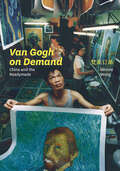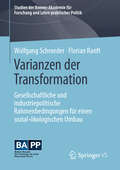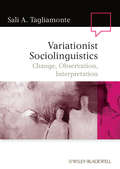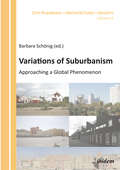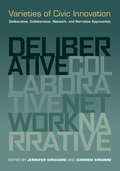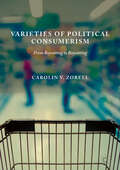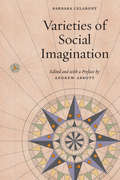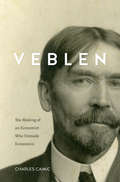- Table View
- List View
Van Gogh on Demand: China and the Readymade
by Winnie Won Yin WongIn a manufacturing metropolis in south China lies Dafen, an urban village that famously houses thousands of workers who paint van Goghs, Da Vincis, Warhols, and other Western masterpieces for the world market, producing an astonishing five million paintings a year. To write about work and life in Dafen, Winnie Wong infiltrated this world, first investigating the work of conceptual artists who made projects there; then working as a dealer; apprenticing as a painter; surveying wholesalers and retailers in Europe, East Asia and North America; establishing relationships with local leaders; and organizing a conceptual art exhibition for the Shanghai World Expo. The result is Van Gogh on Demand, a fascinating book about a little-known aspect of the global art world--one that sheds surprising light on the workings of art, artists, and individual genius. Confronting big questions about the definition of art, the ownership of an image, and the meaning of originality and imitation, Wong describes an art world in which idealistic migrant workers, lofty propaganda makers, savvy dealers, and international artists make up a global supply chain of art and creativity. She examines how Berlin-based conceptual artist Christian Jankowski, who collaborated with Dafen's painters to reimagine the Dafen Art Museum, unwittingly appropriated the work of a Hong Kong-based photographer Michael Wolf. She recounts how Liu Ding, a Beijing-based conceptual artist, asked Dafen "assembly-line" painters to perform at the Guangzhou Triennial, neatly styling himself into a Dafen boss. Taking the Shenzhen-based photojournalist Yu Haibo's award-winning photograph from the Amsterdam's World Press Photo organization, she finds and meets the Dafen painter pictured in it and traces his paintings back to an unlikely place in Amsterdam. Through such cases, Wong shows how Dafen's painters force us to reexamine our preconceptions about creativity, and the role of Chinese workers in redefining global art. Providing a valuable account of art practices in an ascendant China, Van Gogh on Demand is a rich and detailed look at the implications of a world that can offer countless copies of everything that has ever been called "art. "
Vandalism and Anti-Social Behaviour
by Roger Hopkins Burke Matt LongThere has been a lack of theorisation and conceptualisation of vandalism and anti-social behaviour in criminology in the decades following Cohen's seminal typology of vandalism in the 1970s. This important book forwards a new typology of vandalism, one that addresses the various challenges of the late modern world, rather than the older industrial world Cohen addressed. Matt Long and Roger Hopkins Burke analyse the various types of vandalism and anti-social behaviour conducted by individuals. However, they highlight that individuals are not always the locus of blame - the state also has the capacity to act in a profoundly anti-social way. Crucially, Long and Hopkins Burke argue that in order to fully understand vandalism and anti-social behaviour, a culturally criminological perspective should be fostered. This is a perspective which accounts for both the emotional and experiential aspects of crime as well as its broader social and political contexts.
Vandalismus an Schulen
by Ina HerrmannKritzeleien und Graffiti werden alltagstheoretisch als Vandalismus und somit als grundlegend negativ konnotierte Ausdrucksformen bezeichnet. Jedoch lassen sich vandalistische Praktiken als akteursseitige 'Gebrauchsspuren' oder ,Inbesitznahmen' lesen, die im Rahmen dieser Studie als manifester Bestandteil einer Schularchitektur rekonstruiert werden. Vor dem raumtheoretischen Hintergrund sind die latenten Bedeutungsstrukturen der sog. Maskierungen des Schulraums zu verorten und hinsichtlich der Frage nach inh#65533;renten Bildungspotentialen zu diskutieren.
Vanishing New York: How a Great City Lost Its Soul
by Jeremiah Moss"Essential reading for fans of Jane Jacobs, Joseph Mitchell, Patti Smith, Luc Sante, and Cheap Pierogi" —Vanity FairAn unflinching chronicle of gentrification in the twenty-first century and a love letter to lost New York by the creator of the popular and incendiary blog Vanishing New York.For generations, New York City has been a mecca for artists, writers, and other hopefuls longing to be part of its rich cultural exchange and unique social fabric. But today, modern gentrification is transforming the city from an exceptional, iconoclastic metropolis into a suburbanized luxury zone with a price tag only the one percent can afford.A Jane Jacobs for the digital age, blogger and cultural commentator Jeremiah Moss has emerged as one of the most outspoken and celebrated critics of this dramatic shift. In Vanishing New York, he reports on the city’s development in the twenty-first century, a period of "hyper-gentrification" that has resulted in the shocking transformation of beloved neighborhoods and the loss of treasured unofficial landmarks. In prose that the Village Voice has called a "mixture of snark, sorrow, poeticism, and lyric wit," Moss leads us on a colorful guided tour of the most changed parts of town—from the Lower East Side and Chelsea to Harlem and Williamsburg—lovingly eulogizing iconic institutions as they’re replaced with soulless upscale boutiques, luxury condo towers, and suburban chains.Propelled by Moss’ hard-hitting, cantankerous style, Vanishing New York is a staggering examination of contemporary "urban renewal" and its repercussions—not only for New Yorkers, but for all of America and the world.
Vanishing Twins: A Marriage
by Leah Dieterich"[Dieterich's] writing is crisp and intelligent . . . She writes about her own reckoning with her sexuality and exploration of queer identity without becoming pat or coy, giving readers intimate access to her fears and conflicting emotions." --NPRFor as long as she can remember, Leah has had the mysterious feeling that she’s been searching for a twin--that she should be part of an intimate pair. It begins with dance partners as she studies ballet growing up; continues with her attractions to girlfriends in college; and leads her, finally, to Eric, whom she moves across the country for and marries. But her steadfast, monogamous relationship leaves her with questions about her sexuality and her identity, so she and her husband decide to try an open marriage.How does a young couple make room for their individual desires, their evolving selfhoods, and their artistic ambitions while building a life together? Can they pursue other sexual partners, even live in separate cities, and keep their original passionate bond alive? Vanishing Twins looks for answers in psychology, science, pop culture, art, architecture, Greek mythology, dance, and language to create a lucid, suspenseful portrait of a woman testing the limits and fluidities of love.
Vanity Fairs: Another View of the Economy of Attention
by Georg FranckThis book offers readers a comprehensive introduction to the economy of attention from the perspective of the basic motive of the pursuit of attention: self-esteem. As a jumping-off point, it states the stark equation at the heart of this economy— that the self-esteem one can afford depends on one’s income of appreciative attention. The information markets in which participants compete to play a role in the consciousness of others are described as ‘vanity fairs’. Since the pursuit of self-esteem is highly effective when it comes to mobilizing human energies, vanity fairs are not just playgrounds of individual passions, but have been utilized by society since time immemorial as markets for particularly challenging demands.Starting with an analysis of the interface that connects the social economy of attention with the intra-psychic economy of self-esteem, the book then examines two main cases in point: modern science and the post-modern media culture. On the one hand we have scientists working for a ‘wage of fame’, who invest their own attention into getting the attention of others. On the other, today’s dominant media have left the sale of information behind to focus solely on the attraction of attention, which is sold as a service to the advertising industry. In each case the use of attention as a means of payment is key to its phenomenal success. But success comes at a price: the dark side of this monetization of attention is a kind of ’climate change’ in the collective mental sphere which threatens the very existence of our social fabric.
Vaqueros, Cowboys, and Buckaroos: The Genesis and Life of the Mounted North American Herders
by Lawrence Clayton Jim Hoy Jerald UnderwoodHerding cattle from horseback has been a tradition in northern Mexico and the American West since the Spanish colonial era. The first mounted herders were the Mexican vaqueros, expert horsemen who developed the skills to work cattle in the brush country and deserts of the Southwestern borderlands. From them, Texas cowboys learned the trade, evolving their own unique culture that spread across the Southwest and Great Plains. The buckaroos of the Great Basin west of the Rockies trace their origin to the vaqueros, with influence along the way from the cowboys, though they, too, have ways and customs distinctly their own. <P><P> In this book, three long-time students of the American West describe the history, working practices, and folk culture of vaqueros, cowboys, and buckaroos. They draw on historical records, contemporary interviews, and numerous photographs to show what makes each group of mounted herders distinctive in terms of working methods, gear, dress, customs, and speech. They also highlight the many common traits of all three groups.
Varianzen der Transformation: Gesellschaftliche und industriepolitische Rahmenbedingungen für einen sozial-ökologischen Umbau (Studien der Bonner Akademie für Forschung und Lehre praktischer Politik)
by Wolfgang Schroeder Florian RanftDieser Sammelband gibt Denkanstöße für Antworten auf die Frage, welche Akteurskonstellationen im politischen System für die Transformation benötigt werden und wie die sozial-ökologische Wende in zentralen industriellen Sektoren gelingen kann. Wie können auf Grundlage der sich abzeichnenden Verteilungskonflikte des ökologischen Umbaus konkrete transformative Maßnahmen mit Blick auf ihre sozialen Implikationen umgesetzt werden? Hierzu erarbeitet der Band eine theoretische Grundlage für die Gelingensbedingungen zur Umsetzung der Transformation. Darauf aufbauend werden die territorialen Ebenen des Wandels in Ostdeutschland und im Ruhrgebiet und Konfliktlinien zwischen Stadt und Land beleuchtet, sowie das Potential regionaler Innovationsnetzwerke besprochen.
Variation in Non-finite Constructions in English: Trends Affecting Infinitives and Gerunds
by Juhani Rudanko Mark KaunistoThis book sheds new light on the nature of gerunds in English, utilizing data from very large electronic corpora in order to compare pairs of patterns viewed as constructions. It serves as a contribution to the study of complementation, an under-researched area of investigation which bridges observations at the intersection of lexico-grammar, syntax and semantics. As a result, the reader develops their understanding of the meaning and use of each pattern within the system of English predicate complementation as it has evolved in recent times. This book will be of interest to students and scholars of English linguistics, especially English grammar.
Variationist Sociolinguistics: Change, Observation, Interpretation (Language in Society #39)
by Sali A. TagliamonteVariationist Sociolinguistics: Change, Observation, Interpretation presents a comprehensive, intermediate level examination of Language Variation and Change, the branch of sociolinguistics concerned with linguistic variation in spoken and written language. Represents the most up-to-date coverage of the history, developments, and methodologies of variationist sociolinguistics Addresses all aspects of linguistic variation, including areas not usually covered in introductory texts, e.g. the phonological, morpho-syntactic, discourse/pragmatic Outlines comparative sociolinguistic approach, data collection, methodological issues; and addresses state-of-the-art contemporary quantitative methods and statistical practice Features cutting-edge research at an appropriate level to facilitate student learning Engages students throughout with a variety of pedagogical features, including Mini Quizzes to test comprehension, extensive Exercises at the end of each chapter, the opportunity to do hands-on quantitative analysis of a never-before published data set, and Notes and Tips that offer insight into conducting sociolinguistic research. Extra materials and answers to the exercises are available at www.wiley.com/go/tagliamonte
Variations of Suburbanism: Approaching a Global Phenomenon (City Planning - Architecture - Society #5)
by Barbara SchöningConsidered to be sub-ordinated and sub-prime to the city, sub-urban areas receive little attention by researchers and designers. However, it's the rapidly growing areas outside the central cities that pose the biggest questions of the urban millennium: How can the scattered patchwork of urban areas and social spaces linked by networks of highways and public transportation function as a sustainable and livable urban environment? Answering this question requires understanding suburban spaces as heterogeneous urban areas with distinct local characteristics, qualities, and problems. Following this path, Variations of Suburbanism explores formation, characteristics, and trends of suburban areas all over the world. It provides insights on common features and differences of suburban governance, design, and infrastructure and discusses strategies to understand and design suburban areas in an increasingly sub-urbanizing world.
Variations of a Building
by Brett MommersteegVariations of a Building tells the story of the making of a building. Based on a multi-sited ethnography of the building project for Aviva Studios (formerly, Factory) in Manchester, U.K., a theatre/cultural space designed by the architectural firm OMA, it explores the challenges of sharing in the act of creation by following the everyday practices of designers. Beyond the world of the architects, this book foregrounds a variety of other practices and realities at stake in the building, and offers a rare account of a building project from the point of view of the broader design and project team. More than the making of a building, it argues that it is also an experiment with, and reshaping of, a common world, showing what design practices and building projects can teach us about sharing in acts of creation and knowing. This book will be of interest to researchers and students of architecture, design, urban studies, Actor-Network Theory and Science and Technology Studies.
Variations of the Welfare State
by Franz-Xaver KaufmannIn the burgeoning literature on welfare regimes and typologies, this comparative study offers a stimulating new perspective. Kaufmann, the doyen of the sociology of social policy in Germany, emphasizes norms, culture and history, in contrast to political economy approaches. Comparing Britain, Sweden, France and Germany, Kaufmann highlights the "idiosyncrasy" of each welfare state: countries are compared with regard to their state traditions and the relationship between state and civil society; their national "social questions"; their economic systems, including the unions and labour law; social security and redistribution; and their personal social services and education. The socio-cultural approach enables Kaufmann to show that not all modern states are welfare states. Some are just "capitalism" (the USA), others are "socialism" (the former Soviet Union). In this light, the (essentially North-West European) welfare state is portrayed as a third way between capitalism and socialism.
Varieties of Civic Innovation: Deliberative, Collaborative, Network, and Narrative Approaches
by Jennifer Girouard Carmen SirianniIn this collection of original essays, empirical analysts and theorists across disciplines turn a critical eye to a variety of recent institutional forms and styles of innovation. They examine lived reality and theoretical underpinning, promise and accomplishment, but also the pitfalls and capacity-building challenges that face virtually all attempts to bring citizen voice, knowledge, and skill to the center of public problem solving. Their analyses are both hopeful and hard-headed and are guided by commitments to help understand appropriate fit and realistic sustainability. Cases include face-to-face deliberation, online networking and citizen journalism, policy forums, and community and stakeholder planning sessions across local, state and federal contexts. Policy issues run a broad gamut from community and regional economic development and environmental sustainability to minority rights and gay marriage.
Varieties of Civic Innovation: Deliberative, Collaborative, Network, and Narrative Approaches
by Jennifer Girouard and Carmen SirianniIn this collection of original essays, empirical analysts and theorists across disciplines turn a critical eye to a variety of recent institutional forms and styles of innovation. They examine lived reality and theoretical underpinning, promise and accomplishment, but also the pitfalls and capacity-building challenges that face virtually all attempts to bring citizen voice, knowledge, and skill to the center of public problem solving. Their analyses are both hopeful and hard-headed and are guided by commitments to help understand appropriate fit and realistic sustainability. Cases include face-to-face deliberation, online networking and citizen journalism, policy forums, and community and stakeholder planning sessions across local, state and federal contexts. Policy issues run a broad gamut from community and regional economic development and environmental sustainability to minority rights and gay marriage.
Varieties of Civil Society Across Asia (Routledge Contemporary Asia Series)
by Jeff Kingston Ruth Phillips Stephen Noakes M. Anwar Hossen Akihiro Ogawa Simon Avenell Anthony J. Spires Ian Rowen Herlin Chien Deanna Davy Jude Fernando Udan Fernando Mayuko Itoh Bonnie Jin Yan-Ho Lai David Lozada Rawin Leelapatana Bodh Maathura Machiko Osawa Geri Mason Jorge V. TignoThis book explores civil societies with distinct characteristics in Asian countries and regions to redefine the dynamic and interconnected formation that is Asia.This book documents how civil society organizations, such as charities and foundations, across Asia which have traditionally been observed to imitate or borrow the methods employed by Western nongovernmental organizations, have been developing distinctive relations with the state, inventing novel civic techniques. Furthermore, it highlights how such organizations have created a characteristic framework for governance and spaces for new social practices and reflections. Reflecting on the historical backgrounds, political systems, and cultural settings, each case study reveals the diverse and alternative approaches and solutions to various issues facing contemporary Asian society.Studying the dynamism of Asia to highlight the emergence of new civil society practices this book will be a great interest to scholars and students of Asian Studies, Anthropology, Sociology & Political Science.
Varieties of Political Consumerism: From Boycotting to Buycotting
by Carolin V. ZorellThis book provides an analysis of the politics of consumption and how the ‘educated consumer’ plays a vital role in advancing responsible market practices and consumption. Based on a comprehensive interdisciplinary perspective, it explores the extent, drives and links of boycotting, buycotting, labelling schemes and Corporate Social Responsibility (CSR) in 20 European countries. A central question addressed is whether macro-societal patterns of orientation concerning the roles of the state, companies and citizens can explain individual and cross-national differences in boycotting and buycotting. As the book shows, there is not one type of ‘political consumer’, but several, and their occurrence is directly connected to national variations of labelling schemes and Corporate Social Responsibility. Consumers need reference points and information on the political backgrounds of purchases, and policy makers must address that need through political measures which fit to the national patterns in views about cooperation and market relationships.
Varieties of Secularism in a Secular Age
by Craig Calhoun Jonathan Vanantwerpen Michael WarnerIn the book a prominent and varied group of scholars chart the conversations in which a secular age intervenes and address wider questions of secularism and secularity.
Varieties of Social Explanation: An Introduction to the Philosophy of Social Science
by Daniel LittleProfessor Little presents an introduction to the philosophy of social science with an emphasis on the central forms of explanation in social science: rational-intentional, causal, functional, structural, materialist, statistical and interpretive. The book is very strong on recent developments, particularly in its treatment of rational choice theory, microfoundations for social explanation, the idea of supervenience, functionalism, and current discussions of relativism.Of special interest is Professor Little's insight that, like the philosophy of natural science, the philosophy of social science can profit from examining actual scientific examples. Throughout the book, philosophical theory is integrated with recent empirical work on both agrarian and industrial society drawn from political science, sociology, geography, anthropology, and economics.Clearly written and well structured, this text provides the logical and conceptual tools necessary for dealing with the debates at the cutting edge of contemporary philosophy of social science. It will prove indispensible for philosophers, social scientists and their students.
Varieties of Social Imagination
by Andrew Abbott Barbara CelarentIn July 2009, the American Journal of Sociology (AJS) began publishing book reviews by an individual writing as Barbara Celarent, professor of particularity at the University of Atlantis. Mysterious in origin, Celarent’s essays taken together provide a broad introduction to social thinking. Through the close reading of important texts, Celarent’s short, informative, and analytic essays engaged with long traditions of social thought across the globe—from India, Brazil, and China to South Africa, Turkey, and Peru. . . and occasionally the United States and Europe. Sociologist and AJS editor Andrew Abbott edited the Celarent essays, and in Varieties of Social Imagination, he brings the work together for the first time. Previously available only in the journal, the thirty-six meditations found here allow readers not only to engage more deeply with a diversity of thinkers from the past, but to imagine more fully a sociology—and a broader social science—for the future.
Varieties of the Gaming Experience
by Robert PerinbanayagamThe games that human societies devised over the centuries can be considered one of the most comprehensive and fertile symbolic systems ever created by human ingenuity. In all societies, members feel compelled to interact and communicate with each other as much as possible. As linguistic creatures, humans use language to establish social and interpersonal contacts. Games are a device to enable such connections.Robert Perinbanayagam examines how players value games. He assesses games as systems that embody metaphysics and pragmatic action. He then examines various religious ideas and how participants reference respective approaches to game playing.Perinbanayagam argues that games are forms of activity in which the human agent as an actor engages with others in various interactional situations. Such engagement creates dramas in which agents assume identities, give play to emotions and enrich their selves. He also examines the issue of game writing, particularly how selected writers have used game structures as narrative devices in their work.
Vaterschaft in Regenbogenfamilien: Eine Fallstudie zur Familiengestaltung und Elternpraxis homosexueller Männer (Familienforschung)
by Christian SagertChristian Sagert geht in diesem Buch der Frage auf den Grund, wie Väter ihre Lebenspraxis in gemeinsam realisierten Regenbogenfamilien gestalten, in denen eine normativ idealisierte Mutterrolle vermeintlich nicht existiert. Die qualitative Studie legt den Fokus erstmals auf Männerpaare, die den Wunsch nach Familiengründung fern von heterosexuellen Gründungszusammenhängen realisiert haben und macht dabei deutlich, welche Wirkungsmacht heteronormative Gesellschaftsstrukturen gerade für diese Familien entfalten. Daneben wird ein ausführlicher Überblick über die Lebenssituationen dieser Familien in Deutschland geboten: So werden u.a. die verschiedenen Entstehungszusammenhänge, die rechtliche Rahmung sowie Heteronormativität und Stigmata herausgestellt.
Vaulting Ambition: Sociobiology and the Quest for Human Nature
by Philip KitcherVaulting Ambitionis the first extensive and detailed evaluation of the controversial claims that sociobiologists have made about human nature and human social behavior. It raises the "sociobiology debate" to a new level, moving beyond arguments about the politics of the various parties involved, the degree to which sociobiology assumes genetic determinism, or the falsifiability of the general theory. Sociobiology has made a great deal of noise in the popular intellectual culture. Vaulting Ambition cuts through the charges and counter-charges to take a hard look at the claims and analyses offered by the sociobiologists. It examines what the claims mean, how they relate to standard evolutionary theory, how the biological models are supposed to work, and what is wrong with the headline-grabbing proclamations of human sociobiology. In particular, it refutes the notions that humans are trapped by their evolutionary biology and history in endlessly repeating patterns of aggression, xenophobia, and deceitfulness, or that the inequities of sex, race, and class are genetically based or culturally determined. And it takes up issues of human altruism, freedom, and ethics as well. Kitcher weighs the evidence for sociobiology, for human sociobiology, and for "the pop sociobiological view" of human nature that has engendered the controversy. He concludes that in the field of nonhuman animal studies, rigorous and methodologically sound work about the social lives of insects, birds, and mammals has been done. But in applying the theories to human beings-where even more exacting standards of evidence are called for because of the potential social disaster inherent in adopting a working hypothesis as a basis for public policy - many of the same scientists become wildly speculative, building grand conclusions from what Kitcher shows to be shoddy analysis and flimsy argument. While it may be possible to develop a genuine science of human behavior based on evolutionary biology, genetics, cognition, and culture, Kitcher points out that the sociobiology that has been loudly advertised in the popular and intellectual press is not it. Pop sociobiology has in fact been felled by its overambitious and overreaching creators.
Vaulting the Color Bar
by Sylvia Ann Hewlett Maggie JacksonAn era of vibrant diversity is rewriting our culture, schools, workplaces and history. But more than a decade into the twenty-first century, talent of color are not breaking into the top executive ranks in numbers proportionate to their achievements and demographic mass. To move past lingering bias and subtle exclusion, people of color need the powerful advocacy of sponsorship. This robust relationship capital drives engagement and retention, fostering workplaces of inclusion, authenticity and innovation. Sponsorship levers talent of color and syncs progressive organizations with a rapidly diversifying world.
Veblen (Routledge Studies In The History Of Economics Ser. #115)
by Charles CamicA bold new biography of the thinker who demolished accepted economic theories in order to expose how people of economic and social privilege plunder their wealth from society’s productive men and women.Thorstein Veblen was one of America’s most penetrating analysts of modern capitalist society. But he was not, as is widely assumed, an outsider to the social world he acidly described. Veblen overturns the long-accepted view that Veblen’s ideas, including his insights about conspicuous consumption and the leisure class, derived from his position as a social outsider.In the hinterlands of America’s Midwest, Veblen’s schooling coincided with the late nineteenth-century revolution in higher education that occurred under the patronage of the titans of the new industrial age. The resulting educational opportunities carried Veblen from local Carleton College to centers of scholarship at Johns Hopkins, Yale, Cornell, and the University of Chicago, where he studied with leading philosophers, historians, and economists. Afterward, he joined the nation’s academic elite as a professional economist, producing his seminal books The Theory of the Leisure Class and The Theory of Business Enterprise. Until late in his career, Veblen was, Charles Camic argues, the consummate academic insider, engaged in debates about wealth distribution raging in the field of economics.Veblen demonstrates how Veblen’s education and subsequent involvement in those debates gave rise to his original ideas about the social institutions that enable wealthy Americans—a swarm of economically unproductive “parasites”—to amass vast fortunes on the backs of productive men and women. Today, when great wealth inequalities again command national attention, Camic helps us understand the historical roots and continuing reach of Veblen’s searing analysis of this “sclerosis of the American soul.”
